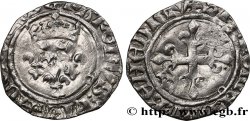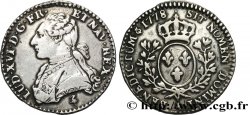MONNAIES 24 (2005)
起拍价 : 1 200.00 €
估价 : 2 200.00 €
未售出的物品
起拍价 : 1 200.00 €
估价 : 2 200.00 €
未售出的物品
种类 Médaille AR 45, Révocation de l’Édit de Nantes
日期: 1685
材质 silver
直径 45 mm
模子方针 12 h.
重量 44,96 g.
关于品相的说明
Exemplaire remarquablement bien conservé et recouvert d’une jolie patine grise de médaillier. Infime usure sur les reliefs les plus hauts
出版目录中的项代码 :
家谱
Médaille provenant de la collection M.L.F.A.
正面
正面的文字 LVDOVICVS. MAGNVS. REX. CHRISTIANISS..
正面的说明书 Buste de Louis XIV à droite, signé au-dessous R
.
正面的翻译 (Louis le Grand, roi très chrétien).
背面
背面的文字 .HAERESIS - EXTINCTA..
背面的说明书 La Religion debout, brandissant une croix et tenant le livre des Évangiles. À ses pieds l’Hérésie, représentée par une figure terrassée. Au fond le portail d’une église ; à l’exergue : .EDICTVM. OCTOBRIS / .M. DC. LXXXV. / H. ROVSSEL..
评论
L’Édit de Nantes (1598) avait assuré la liberté religieuse aux protestants français. L’acte de Révocation, médité et corrigé maintes fois par le roi, fut signé le 18 octobre. L’Édit de Fontainebleau ordonnait la démolition des temples calvinistes et la cessation des exercices, la fermeture des écoles protestantes, l’exil des ministres qui ne voudraient pas se convertir et la peine de galères pour tout sujet qui sortirait du royaume. Plus de 200.000 Français s’exilèrent, parmi lesquels des magistrats et des savants, des soldats et des artisans qui renonçaient à leur patrie pour ne pas renier leur foi. Beaucoup allaient en Allemagne, tout particulièrement en Prusse, où l’électeur les accueillit à bras ouverts. Les émigrés créèrent à l’étranger des industries où la France avait jusqu’alors la prééminence. Pour la France, c’était une élite qui fut perdue et il en résulta une crise économique et sociale.
The Edict of Nantes (1598) had guaranteed religious freedom to French Protestants. The Act of Revocation, considered and amended many times by the king, was signed on October 18. The Edict of Fontainebleau ordered the demolition of Calvinist churches and the cessation of religious exercises, the closure of Protestant schools, the exile of ministers who refused to convert, and the galley punishment for any subject who left the kingdom. More than 200,000 French people went into exile, including magistrates and scholars, soldiers, and artisans who renounced their homeland so as not to renounce their faith. Many went to Germany, especially Prussia, where the Elector welcomed them with open arms. The émigrés created industries abroad where France had previously held preeminence. For France, it was an elite that was lost and the result was an economic and social crisis.
The Edict of Nantes (1598) had guaranteed religious freedom to French Protestants. The Act of Revocation, considered and amended many times by the king, was signed on October 18. The Edict of Fontainebleau ordered the demolition of Calvinist churches and the cessation of religious exercises, the closure of Protestant schools, the exile of ministers who refused to convert, and the galley punishment for any subject who left the kingdom. More than 200,000 French people went into exile, including magistrates and scholars, soldiers, and artisans who renounced their homeland so as not to renounce their faith. Many went to Germany, especially Prussia, where the Elector welcomed them with open arms. The émigrés created industries abroad where France had previously held preeminence. For France, it was an elite that was lost and the result was an economic and social crisis.








 对产品描述纠错
对产品描述纠错 打印
打印 分享我的选择
分享我的选择 提问
提问 Consign / sell
Consign / sell
 产品介绍
产品介绍















